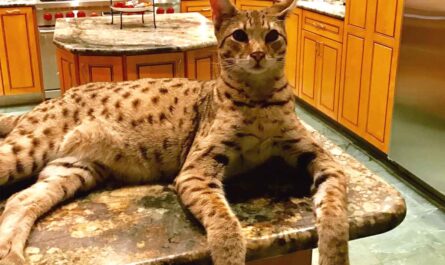The Birman, colloquially known as the “Sacred Cat of Burma,” cat breed emerges as an exquisite, semi-longhaired feline distinguished by a distinct coloration scheme. Exhibiting darker tones on their face, legs, ears, and tail, their ethereal body emanates a pale hue. Their defining feature, the captivating azure eyes, further adds to their allure. Birmans, standing on the larger side of the feline spectrum, possess a robust physique supported by short, sturdy legs.
The Birman cat, a magnificent longhaired feline adorned with deep azure eyes, exhibits a distinctive coloration that graces its face, ears, tail, and paws with darker shades, creating an enchanting contrast. While their ancestry remains veiled in mystique and legend, these domestic cats have captured the hearts of many.
Origin and History
The Birman, often hailed as the “Sacred Cat of Burma,” boasts a rich and enigmatic history, making it one of the most ancient feline breeds. While the exact origins of this majestic cat remain shrouded in mystery, legends surrounding its lineage abound.
Perhaps the most renowned tale recounts a group of white, yellow-eyed cats dwelling within a Burmese monastery. These feline sentinels guarded the Temple of Lao Tsun with unwavering devotion. The temple’s venerable head priest, Mun-Ha, and his cherished cat, Sinh, engaged in nightly prayers before the temple’s blue-eyed goddess, Tsun-Kyan-Kse. However, one fateful night, Siamese invaders seized control, and tragedy befell Mun-Ha. In the wake of his passing, Sinh stood as a steadfast guardian, undergoing a remarkable transformation. His fur adopted a resplendent golden hue, and his once-yellow eyes turned a brilliant shade of blue, a symbol of his newfound purity. Notably, his paws retained their pristine white. See why thousands of cats love BoxCat
In truth, it is plausible that these so-called “Siamese invaders” were, in fact, Siamese cats that mingled with the local feline populace, culminating in the emergence of the Birman.
The first Birman, a pregnant female, embarked on a journey to France in 1919, marking a pivotal moment in the breed’s history. Rapidly, it carved a niche for itself in Europe and gained recognition in the United States in 1967, eight years after its initial introduction. As of 2013, the Birman ranks as the 15th most sought-after purebred cat in the United States.
Facts
Lifespan
12 – 16 Years
Weight
2.7 – 5.4kg
Affection
4/5
Child friendliness
4/5
Grooming difficulty
5/5
Intelligence
5/5
Dog friendly
3/5
Shedding
3/5
Birman Cat Breed Profile
If you seek an affectionate yet low-maintenance feline companion, the Birman is an ideal choice. They effortlessly coexist with other pets and children, often evolving into cherished “lap” cats, thanks to their abundant affection. Playfulness and restraint in vocalization characterize their disposition.
Four dainty white paws grace the Birman’s frame, with their pure white covering extending up the hind legs, akin to a pair of elegant tube socks. A plush, broad head crowns this regal creature, hosting medium-sized, gently rounded ears.
While Birmans predominantly adhere to their distinctive color patterns, they reveal a diverse palette, including Seal, Blue, Lilac, Red, Cream, Chocolate, Seal Torti (exclusive to females), Seal Tortie Tabby, Blue Tabby, and Seal Tabby. Owning a Birman is a delight to cherish!
Characteristics and Temperament
Birman cats are a breed renowned for their distinctive characteristics and delightful temperament, making them a highly sought-after choice for cat lovers. Cat accessories on Amazon
Laid-Back Demeanor: Birmans are celebrated for their calm and composed demeanor. They are not known for frenetic bursts of activity or hyperactive behavior. Instead, they exude an air of tranquility and elegance. This temperament makes them an excellent choice for families with children or other pets. Birmans tend to get along well with everyone, creating harmonious environments in multi-pet households.
Affectionate Nature: One of the most endearing qualities of Birmans is their deep well of affection. They are known for forming profound bonds with their human companions. If you’re seeking a cat that enjoys companionship and isn’t overly independent, the Birman is an ideal choice. Birmans often seek out their humans for affection and are content to curl up beside you for hours of cuddles.
Moderate Energy Levels: Birmans are not known for their high energy levels. They are not the most active of cat breeds, which can be a boon for families looking for a more easygoing pet. While they may not engage in vigorous play sessions for hours on end, they do have a playful streak. This playfulness is not only entertaining but also serves to keep them fit and active, preventing weight gain.
Mental Stimulation: Despite their laid-back nature, Birmans are intelligent and benefit from moderate mental stimulation. Their beautiful, silky coats require regular grooming, which can be seen as a form of mental engagement for these astute felines. Additionally, interactive toys and puzzles can pique their interest and provide mental exercise.
Lustrous Locks: The Birman’s coat is undeniably one of its most striking features. Those luxurious, silky locks require some maintenance to keep them in top condition. However, many Birmans are quite fastidious and may assist in their grooming efforts. Regular brushing not only ensures their coat remains free of tangles and mats but also strengthens the bond between you and your Birman.
Birman cats are a blend of elegance, affection, and playfulness. Their gentle disposition and compatibility with various living situations make them cherished companions. Understanding their characteristics and providing the right environment will ensure a happy and contented Birman in your home.
Personality and Temperament
For those who admire the Siamese’s pointed color pattern but prefer a quieter disposition, Birmans emerge as an excellent choice. These felines exude a tranquil, affectionate nature, devoid of incessant chatter. Instead, they are reticent, gentle, and devoted companions. Birmans take pleasure in shadowing their human counterparts, actively engaging without exhibiting domineering traits.
Intelligence and curiosity define the Birman’s essence, often driving them to explore their surroundings with an inquisitive zeal, occasionally leading them into amusing escapades.
Their melodic, subdued vocalization is a tool employed to convey hunger or solicit attention. Sharing moments of serenity on the couch constitutes their idea of bliss.
Behavior
Birmans exude a playful and curious demeanor, ever eager for an engaging game or an occasional cuddle. They embody peace, congeniality, and an unmistakable sense of autonomy. Ideal for families, Birmans thrive in an outdoor environment, allowing their adventurous spirits to roam safely.
Historically bred as cherished companions, Birmans have garnered a reputation for being exceedingly affectionate. Their endearing docility, sociable disposition, astute intellect, and inquisitive nature make them people-centric to the core. In shared living spaces, Birmans prove to be amiable, unobtrusive, and delightful roommates.
A cacophonous meow for sustenance is not a Birman’s style; rather, they coexist as harmonious housemates, promising an enriching cohabitation.
Common Birman Health Concerns:
Congenital Hypotrichosis: A rare condition characterized by hairlessness at birth, coupled with an immune deficiency that heightens susceptibility to infections, potentially culminating in fatality.
Corneal Dermoid: Involves the growth of skin and/or hair over the cornea’s surface, typically corrected through surgical intervention.
Spongiform Degeneration: A progressive degenerative ailment impacting the central nervous system, causing weakness in the hind legs and coordination issues.
Feline Hypertrophic Cardiomyopathy: An inherited ailment that poses diagnostic challenges, often manifesting in sudden fatalities. It arises from the thickening of the heart’s walls, with older males most commonly affected. Early detection via echocardiogram may allow treatment with medication. Symptoms include anorexia, lethargy, breathing difficulties, coughing, fainting, and leg paralysis, though some cats may remain asymptomatic.
Birman owners often seek insurance coverage for a range of issues, including foreign body ingestion, renal (kidney) disorders, trichobezoars, urethral disorders, and vomiting.

Care and Maintenance of Birman Cats
Birman cats, with their long and luxurious coats, are undoubtedly stunning. However, these beautiful coats come with a certain level of maintenance to ensure your Birman stays happy and healthy. See why thousands of cats love BoxCat
Grooming
Regular grooming is a must for Birman cats, ideally two to three times a week. While some Birmans may have hair that is less prone to tangling, a consistent grooming routine is essential to prevent mats and minimize shedding. Grooming not only keeps their coat in top condition but also reduces the formation of hairballs and the amount of fur on your floors and furniture.
The Birman cat boasts a resplendent, silky coat, a double-edged sword that demands meticulous care and is prone to matting without regular grooming sessions. Frequent brushing with a comb and a brush forms an integral part of Birman care.
Compared to the Persian breed, dealing with a Birman’s coat proves less formidable. Commencing grooming routines from a young age facilitates their adjustment to the process, and they wholeheartedly embrace the attention it brings.
Due to their long fur, Birmans contend with hairball issues. Vigilance is necessary, watching for alterations in appetite or signs indicating that a hairball might induce gastrointestinal distress or obstruction.
Many Birmans can manage some of their grooming independently due to their gentle and fastidious nature. However, your assistance with regular brushing will go a long way in maintaining their coat’s health and appearance. Thankfully, grooming Birmans is often a pleasant experience, especially if they have been introduced to baths and grooming routines from a young age.
Bathing
While Birmans are known for their self-grooming abilities, giving them an occasional bath can rejuvenate the luster of their coat. It’s essential to remove any mats before bathing, as water can make existing tangles worse. Trimming their nails before a bath can also be helpful if your cat tends to be a bit reluctant during this process.
Litter Choice
Birmans have lighter midsection fur, which can be susceptible to staining from their litter. Therefore, selecting the right type of litter is crucial. Opt for a high-quality litter that is less likely to stick to their fur and cause discoloration.
Diet and Nutrition
Proper nutrition is essential for the health of your Birman cat. Consult with your veterinarian to determine the best diet for your specific cat, taking into consideration factors like age, activity level, and any dietary restrictions.
Regular Vet Visits
Regular check-ups with the veterinarian are crucial to ensure your Birman’s overall health. Routine vaccinations, dental care, and preventive measures for fleas and ticks should all be discussed with your vet.
Exercise and Mental Stimulation
Birmans, despite their placid nature, benefit from regular play and exercise to maintain a healthy weight and mental stimulation. Interactive toys and playtime can keep them engaged and happy.
Love and Affection
Don’t forget that Birmans are known for their affectionate nature. Spend quality time with your Birman, provide plenty of attention, and nurture the bond you share with this loving feline companion.
Caring for a Birman cat involves regular grooming, a proper diet, veterinary care, and lots of love and attention. With the right care and attention, your Birman will thrive and bring joy to your home for many years to come.
Recommended Diets for Birman Cats
A raw diet or homemade cat food aligns with Birman’s dietary needs, although consulting your vet before transitioning diets is prudent. Commercial cat food also proves suitable, providing diverse options to meet individual preferences. Prioritizing low-carb, additive-free options with regular meal schedules is essential. Adequate access to clean, fresh water remains paramount.
Birman Cat: Pros and Cons
Birman cats, often referred to as the “Sacred Cats of Burma,” are known for their stunning appearance and unique personality traits. Like any breed, they come with their own set of pros and cons that potential cat owners should consider. Cat accessories on Amazon
Pros:
Dazzling Blue Eyes and Unique Coats: One of the most striking features of Birman cats is their dazzling blue almond-shaped eyes, which are truly captivating. They also boast unique, color-pointed coats, similar to Siamese cats, that add to their overall charm.
Profoundly Affectionate and Loyal: Birmans are renowned for their affectionate nature. They form strong bonds with their owners and often seek companionship and physical contact. They are known to be “people cats” and enjoy being in the company of their human family members.
Compatible with Other Pets and Children: Birmans are generally sociable and get along well with other pets, making them a great choice for multi-pet households. They also tend to be patient and gentle with children, making them a suitable choice for families.
Exceptionally Laid Back: These cats have a reputation for being calm and laid back. They are not typically known for being hyperactive or overly demanding, which can be a relief for owners looking for a more relaxed feline companion.
Non-Discriminating Eaters: Birmans are not usually picky eaters. They tend to have a healthy appetite and are relatively easy to feed, which can simplify mealtime for their owners.
Cons:
Prone to Loneliness if Left Alone: Birmans are social cats that thrive on human interaction. If they are left alone for extended periods, they can become lonely and may develop behavioral issues. It’s essential for their well-being that they receive adequate attention and companionship.
Long Hair Entails Maintenance: While the long, silky fur of Birman cats contributes to their beauty, it also requires regular grooming. Owners should be prepared for grooming sessions to prevent matting and keep their coats in good condition.
Susceptible to Weight Gain: Birmans have a tendency to gain weight if their diet is not carefully managed. Obesity can lead to health problems, so owners must monitor their cat’s food intake and ensure they get enough exercise.
Birman cats are a wonderful breed known for their affectionate nature, striking appearance, and compatibility with families and other pets. However, they do require attention, grooming, and a watchful eye on their diet to ensure they remain healthy and happy companions.
Ideal Owners and Homes for Birmans
Birman cats gracefully adapt to a spectrum of living environments, spanning from single individuals pursuing their careers to bustling families with children. Their ardor for play, especially when it involves puzzles and games, renders them versatile companions. Birmans harbor a genuine fondness for owners who invest effort in keeping them engaged without imposing high maintenance demands. See why thousands of cats love BoxCat
A gentle scratch behind the ear or a soothing pat on the back are gestures children tend to excel at, igniting joy in Birman’s hearts. While they might momentarily recline as lap cats, these felines do not linger in one place for extended durations.
The Birman cat seamlessly integrates into various households. Beyond their luxurious coats, they demand minimal maintenance, fostering cherished moments with their human families. Their compatibility with children shines through, underpinned by an abundance of patience. Nevertheless, it is crucial to instill in all children the importance of boundaries and respect for personal space when sharing a home with a Birman. These remarkable felines enjoy a life expectancy of approximately fourteen years, underlining their status as a long-term commitment. Their weight typically ranges between 4 to 5 kg.
Noteworthy Facts
Birman cats, while individually distinct, often share intriguing traits:
- A penchant for compulsive behaviors like chewing non-food items.
- All Birman kittens are born white, their color gradually developing with maturity, while their paws remain white.
- Aptitude for learning tricks such as fetching.
- Preference for low-level lounging spaces rather than high perches.
- Striking resemblance to Ragdoll breeds.
- Birman kittens typically cost between $400 and $600.
- The Birman follows a captivating French naming tradition, linking the name’s initial letter with the year of a kitten’s birth. For instance, kittens born in 2013 would bear names commencing with the letter “K,” while those from 2014 would initiate their names with “L,” and so forth.
Closing Thoughts on Birman Cats
Birman cats stand as a captivating and unique breed, their allure intricately intertwined with mystery and beauty. They thrive in homes with multiple pets or children, exemplifying low-maintenance yet affectionate companions. If you crave loyalty and affection without excessive effort, a Birman cat deserves your consideration.
More Interesting Articles
- 13 Very Interesting Facts About an Orange Tabby Cat
- Maine Coon Cat Breed: Traits, Profile, Personality, Facts
- 13 Interesting Fun Facts about Siamese Cats & Kittens
- 7 Amazing Light Brown (Beige) Cream Cat Breeds
- 10 Amazing Blue Cat Breeds with Short or Long Hair
- 11 Interesting Facts about a Cream Cute Tabby Cat
- 13 Common Symptoms of A Dead Kitten Inside A Cat
- Neutering Male Cats: Behavior and Recovery Guide
- How to Help a Choking Cat: Signs, Precautions, Tips
- Cat Dry Heaving: Cat Gagging Causes and What to Do
- Why is My Cat Panting? Symptoms, and Treatment
- 26 Tips How to Train A Cat Not to Scratch You or Anything
- Everything You Need to Know about Owning A Cat: 23 Facts
- How to Easily Train Your Cat to Use Toilet in One Week
- 10 Steps How to Train A Kitten to Use A Litter Box in a Week
- 10 Tips How to Train A Cat to Walk On a Leash in A Week
- 6 Steps How to Train A Cat Not to Bite Your Hand or Skin
- 6 Steps How to Get My Cat to Stop Jumping on the Counter
- 8 Tips on Introducing A New Dog To A Cat Step By Step
- 27 Tips How to Train An Outdoor Cat to Stay Home



